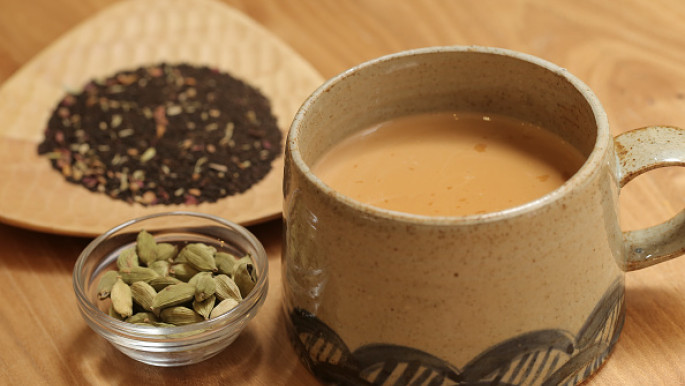Top three plant milks to veganise your karak this Arab Veganuary
Karak tea, sometimes known as Adeni tea, was imported to the Arabian Peninsula and Gulf from the Asian subcontinent and is central to their tea culture. While the tea isn't as popular in the Levant and North Africa, it is still embraced as a treat from the Gulf.
For me, karak tea has always been a reminder of spending holidays in Kuwait with my family. My pre-vegan dairy-loving self used to go to Souq Mubarakiya – the country's oldest market – and juggle between a warm cup of karak and ice cream. When I finally learned how to make it, it became my nostalgic comfort drink after a long day and a tiring trip on the London underground during rush hour.
So when I turned vegan, I did so knowing my karak days were up. Or at least I thought they were.
Months later when my karak cravings kicked in, I decided to venture into the kitchen and see what I could do with plant-based milks. So here are my top three tried and tested plant milks to use when making karak and tips on how to navigate around them:
Soya milk:
The OG plant milk. For years, I stayed away from it because I was worried about the potential health risks in drinking soya milk, but the more I read about soy, the more I realised my fears of soy came from scare-mongering articles I read in the mid-2000s.
Soya milk is amazing because it's easily accessible and creamy. It doesn't have its own flavour that overpowers the delicious spices in karak tea and as a milk it's heavy enough to mimic full fat cow's milk.
 |
|
| Souq Mubarakiya is a trademark market in Kuwait [Getty] |
For someone who doesn't traditionally like soya milk, I either use a sweetened version (my favourite is Alpro's barista soya milk) or I add a tiny amount of vanilla extract to neutralise the nutty soya taste.
Many use evaporated or condensed milk to thicken the texture of karak tea. To get this consistency with soya milk, it can be heated to reduce the water consistency and to make thicker if desired.
Evaporated milk has around 60 percent less water than traditional milk. To reduce the soya milk, it must be done on low heat with a slow cooking process and must be whisked often to avoid scorching. Reduction can sometimes take 1-2 hours, so come prepared.
Coconut milk:
My go-to plant milk. It tastes amazing with everything and it's perfect for when I want to make sweet coffee.
The taste of coconut milk is strong, so if you don't like coconut, I wouldn't recommend it. For those who do like coconut milk, the flavour of the milk doesn't clash with the spices used in karak tea, but you may want to allow the tea and spices to marinate for longer so they truly come out in the karak.
Because coconut milk is naturally thick and creamy, there's often no need to thicken it further. However, it can be reduced to thicken if needed, on a low and slow heat, with whisking often to avoid scorching just like soya milk.
 |
|
| Karak tea originates from the Indian subcontinent [Getty] |
Oat milk:
Hailed as the best kind of plant milk for drinks and the one with impeccably close taste and texture to cow's milk, it would be impossible to forget oat milk.
Traditionally, oat milk is very creamy but its texture can depend on the ratio of oats and water used, so make sure you use good quality oat milk.
There's no overpowering distinct flavour to oat milk. It is creamy but for those who drink oat milk often, they are able to recognise the taste instantly.
There are many fears surrounding oat and gluten, but rest assure that oats are naturally gluten-free. The reason they are branded to have gluten is because of cross-contamination with wheat and barley. Gluten-free oats are simply oats that have been dealt with in an isolated environment.
Better yet, you can even make your own at home very easily if you don't have much access to plant milks and you can alter the ratio to your desired consistency. Here's a recipe.
You can use this guide for any hot creamy drink. Happy karak-ing!
Diana Alghoul is a journalist at The New Arab.
Follow her vegan blog on Instagram: @flowerknafeh



